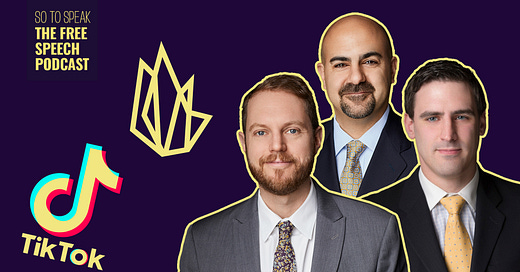Joining us:
Ari Cohn, lead counsel for tech policy
Robert Shibley, special counsel for campus advocacy
Will Creeley, legal director
This webinar was open to the public. Future monthly FIRE Member Webinars will not be. Become a paid subscriber today to receive invitations to future live webinars.
If you became a FIRE Member through a donation to FIRE at thefire.org and would like access to Substack’s paid subscriber podcast feed, please email sotospeak@thefire.org.
Timestamps:
00:00 Intro
00:52 Donate to FIRE!
02:49 TikTok ban
10:01 Ari’s work as tech policy lead counsel
12:03 Mandatory DEI statements at universities
15:19 How does FIRE address forced speech?
18:17 Texas’ age verification law
24:35 Would government social media bans for minors be a First Amendment violation?
33:48 Online age verification
35:17 First Amendment violations while making public comments during city council/school board public meetings
37:25: Edison, New Jersey city council case
39:48 FIRE’s role in educating Americans
41:55 If social media addiction cannot be dealt with like drugs, how can it be dealt with?
43:34 “Pessimists Archive” Substack and moral panics
45:27 Trump and the media
51:23 Gary Gadwa case
52:49 How to distinguish the freedom of speech versus freedom from social consequences?
55:53 Free speech culture is a “mushy concept”
57:58 ABC settlement with Trump
01:01:27 Nico’s upcoming book!
01:02:32 FIRE and K-12 education
01:04:40 Outro
Show notes:
“TikTok Inc. and ByteDance LTD. v. Merrick B. Garland, in his official capacity as attorney general of the United States” (D.C. 2024)
“Opinion: The TikTok court case has staggering implications for free speech in America” L.A. Times (2024)
H.B. No. 1181 (Tex. 2023; Texas age-verification law)
“The Anxious Generation” Jonathan Haidt (2024)
S. 1409 - Kids Online Safety Act (2023-2024)
American Amusement MacH. Ass’n v. Kendrick (Ind. 2000)
“Edison Township, New Jersey: Town Council bans props, including the U.S. flag and Constitution, at council meetings” FIRE (2024)
“LAWSUIT: Arizona mom sues city after arrest for criticizing government lawyer’s pay” FIRE (2024)
“Trump v. American Broadcasting Companies, Inc.” (2024)
“New Jersey slaps down censorship with anti-SLAPP legislation” FIRE (2023)
“FIRE defends Idaho conservation officer sued for criticizing wealthy ranch owner’s airstrip permit” FIRE (2023)
“On Liberty” John Stuart Mill (1859)
“Home Depot cashier fired over Facebook comment about Trump shooting” Newsweek (2024)
“Free speech culture, Elon Musk, and Twitter” FIRE (2022)
“Questions ABC News should answer following the $16 million Trump settlement” Columbia Journalism Review (2024)
“Appellants’ opening brief — B.A., et al. v. Tri County Area Schools, et al.” FIRE (2024)
Edited transcript
Editor's note: This abridged transcript highlights key discussions from the podcast. It has been lightly edited for length and clarity. Please reference the full unedited transcript for direct quotes.
The proposed TikTok ban
NICO PERRINO, HOST: I'm going to start with one line of questioning that many people have asked. Is the TikTok ban a permissible exception from the freedom of speech? Will, tell us what happened at the DC Circuit about a week and a half ago, where things stand now, and what FIRE's position is.
WILL CREELEY, GUEST: The United States Court of Appeals for the District of Columbia, just one step below the Supreme Court, heard the case. They have exclusive and original jurisdiction over the constitutional challenge to this law that was passed by Congress and signed into law by President Biden. They ruled that it is constitutional. They consolidated the TikTok challenge and the challenge regarding its users, and they said they assumed without deciding that the Act had to pass the highest level of constitutional scrutiny, and they said that it did. There are national security concerns here that are so compelling that even this unprecedented step of banning an entire communication platform passed First Amendment scrutiny. Just yesterday, TikTok filed with the Supreme Court asking the court to issue an injunction and then review the constitutionality of the law itself.
Breaking news for all you Members and would-be Members on the call, FIRE will file with the Supreme Court today encouraging it to grant an injunction and take a look for itself at the constitutionality of the law. FIRE's position is that, no, this ban is not within the limited exceptions to the First Amendment.
When the government bans a speech platform used by 170 million Americans, it must do more than merely cite national security concerns. It's got to prove them. We didn't see anything in the public record, which is all the DC Circuit relied upon, that would amount to anything more than conjecture, either with regard to the two concerns that the government identified, manipulation of the content on TikTok and data security. As our brief argues, both concerns are pretty much conjectural.
The DC Circuit admitted there was no specific intelligence indicating that China was manipulating the app’s content. And, as for the data concerns, we raised a number of points in response there. If the act is targeted just at data, it could have had far less sweeping restrictions on an entire expressive medium to address that concern.
It seems lawmakers are targeting TikTok because they dislike the speech on the platform. In fact, there were statements by lawmakers on the record to that effect. It’s an unprecedented step and FIRE will oppose it. The government must justify its actions when taking such a significant step.
PERRINO: Ari, did you have anything you want to add?
ARI COHN, GUEST: Just to reiterate that this is not some small thing. This is quite unprecedented. And the fact that the DC Circuit not only just gave the government a massive amount of deference, but also said, “Well, they haven't proven that it happened or will happen, but maybe it could possibly happen.” That just cannot be enough for the magnitude of what the government is doing here. It has to be more than just some hypothetical, we are worried that such a thing might exist.
Imagine trying to restrict speech in any other context based on some hypothetical, such as, “we are worried that maybe someone might react violently to this speech. We are worried that maybe someone might throw bottles at you.” Nobody would agree that that is sufficient. So, I don't think we should put up with it here either.
PERRINO: This is the first time, I believe, that the United States government has banned a speech platform. Full stop. And we've been concerned at FIRE for years now about the banning of speech platforms internationally, whether it's X in Brazil or China or Russia banning many of America's social media platforms. In all those cases, it's done on national security grounds and national security justifications for banning speech date back to the early days of American history.
And many of those justifications we now look back on as wrongheaded, whether you're looking at John Adams’ Sedition Act, which was justified based on the quasi war with France, or you look at the Espionage and Sedition Acts that were passed during World War I, which jailed thousands of Americans for opposing America's entry into World War I or the draft.
Or you go to the Pentagon Papers case, revealing information about Vietnam. All those free speech cases dealt with national security justifications. There are a couple of things that the government likes to come in based on a conjectural theory to justify censorship. And what is our job as civil libertarians? Remember, FIRE is a free speech organization. Our job as civil libertarians is to hold the government to a high bar when it's trying to use a national security justification to censor speech.
And that's what we're doing here. There was a sealed record in this case, and we thought maybe there might be something in the sealed record that the court would rely on to justify banning TikTok. But no, it said everything that it was using to justify its ban and upholding the law was in the public record. And, for us, that's just not good enough.
Social media effects on kids
PERRINO: Another question we have is, “Do you have thoughts on states using ‘addictive features’ to regulate minors’ access to social media to avoid making the regulation content-based?” A similar question: “Would the bans on social media for young people be a First Amendment violation if it's government mandated?”
People are definitely concerned about the effect of social media on young people. There is debate in Congress over the Kids’ Online Safety Act (KOSA) that would regulate how social media is presented to kids and how kids can access social media.
Let's try and speak broadly here about some of what it's trying to do because it's not just KOSA and the federal government that are trying to mandate some of these approaches to regulating social media access for kids. We're also seeing it in the states, as well. It would be helpful to articulate what those arguments are and how FIRE views them from a free speech, First Amendment perspective.
COHN: Yes, banning kids from social media is absolutely a First Amendment violation. Minors have First Amendment rights and for good reason. Judge Posner articulated it in the best way I've ever seen in a case called American Amusement Machine Association v. Kendrick out of the Seventh Circuit, where he went on a multi-paragraph spiel about how children don't pop out at 18 and automatically know how to navigate the world. They have to have training wheels. You have to actually raise them with getting experience for them to become productive members of society at 18.
You cannot just toss an 18-year-old into life without any context or any experience and expect them to do anything but flounder. And I think that is especially true with social media. We joke about Nigerian prince scams, but can you imagine an 18-year-old logging onto Facebook for the first time with no idea what's going on? They’d easily fall for all kinds of schemes.
It’s terrible for media literacy as well. To go on to KOSA, and some of its analogs, the big thing about KOSA is it’s trying to prevent certain harms to minors. Eating disorders, suicide, depression, anxiety, things like that. The problem is a lot of that content is entirely constitutionally protected. Just because it might be harmful does not make it unprotected. It's difficult to regulate. What Congress has tried to do is say, “Okay, you have a duty of care in your design features.” So, it's not necessarily that you are liable for the content that people post on your site. It is the design features that you then use to feed that content to the minor users, which is really a distinction without a difference. If you say you have a duty to prevent or mitigate, say, eating disorders in the operation of your algorithm, well, the recommendation algorithm by itself devoid of content could not possibly cause an eating disorder.
It can only be justified with reference to the content that the algorithm serves up. So, it's very clearly still directed at content. First of all, if you don't trust social media platforms in the first place, saying that they now should be responsible for preventing and mitigating serious harms to your child seems crazy. Second of all, kids are not a monolith. They experience content differently. They are individuals. And they also have very different experiences in life and can handle different levels of content.
It basically is forcing the platforms to do either A) know what's going to affect each individual child in a particular way, impossible, or B) make decisions based on kids as this blob of a group and what might be harmful to them, which is possible, but entirely unhelpful due to the differences in individuals and age ranges.
I find it very troubling that we have moved to a point where we are starting to talk about regulating addiction to ideas. And that's really what this is, addiction to speech. The entire purpose of media, of every single form of media, is to get your attention and keep it. That is the whole point. Choose your own adventure books do that. Cliffhangers at the end of the season do that.
PERRINO: What about binge watching?
COHN: Yeah. The idea that we can punish people for creating content that people want to keep consuming is just extremely troubling to me.
Trump vs. the media
PERRINO: One question we have is, “Corporate media threatens the freedom of the press after Donald Trump. Does this have an impact on the freedom of speech?”
This question gives us an opportunity to discuss the recent lawsuit filed by President Trump against the Des Moines Register and Ann Seltzer over the polling that they did in Iowa leading up to the presidential election. The poll predicted that Kamala Harris would win by three percentage points in the state of Iowa. Donald Trump ended up winning the state of Iowa by 13 percentage points. The poll got it wildly wrong.
He's now arguing that this poll was a form of consumer fraud. FIRE has posted a statement arguing that running polls for a newspaper is First Amendment protected activity. There's no exception to the First Amendment for getting a poll wrong. But folks are arguing, well, there might have been some malicious intent in the background here or that this was deliberate election interference. What do we as free speech First Amendment advocates make of that?
CREELEY: The President-elect's got to toughen up a little bit. There's going to be a lot of speech out there that he doesn’t like in a lot of newspapers. That's America. That's the way it's been. That's the way it always should be. When we were working on that statement, I said something like, from 1776 to 2024, a free press has kept America great, to use the lingua franca of the President-elect and his supporters. My colleague J.T. Morris said, “Well, what about John Peter Zenger in the pre-revolutionary period?” So, I want to give a shout out to John Peter Zenger as well. The free press keeps us honest, and you're going to see stuff in the free press that you don't like.
We got to watch out here. The President-elect is on record saying he wants to straighten out the press. And if that means filing baseless lawsuits about protected speech, FIRE's going to be on the case.
PERRINO: What's the problem, Will? What's the problem, Ari and Robert, with filing these lawsuits and seeing what's there, right? The argument on the other side is that we suspect there's something going on here that might violate a consumer protection law.
COHN: There is absolutely nothing that they could possibly find that could remotely, even plausibly, be a basis for this lawsuit. It will be a miracle if the lawyers don't get sanctioned. Even if there was malicious intent and they said, “Oh, yeah, we're going to put out this fake poll,” guess what? That's also constitutionally protected because lies are not ipso facto devoid of constitutional protection. They can be defamatory. This certainly was not. But just publishing a poll because you want to hurt someone's campaign is no different than publishing a news article saying this person is a terrible candidate for X, Y, and Z.
CREELEY: Let's say “The Onion” ran a poll two weeks before and distributed it to every household in Iowa saying that Ronald McDonald was polling at 240% and all the other candidates were at zero. We would laugh this out of court, right? And we're talking about a respected pollster who's gone way back.
Getting a poll wrong is not the equivalent of product liability fraud. It's not election interference to get a poll wrong. And, as Ari says, even if you go in and say, “Oh, look, their sample size is under sampling Trump supporters and that's how they got this,” even then, you're not there. Wake me up when they run something that says like, “Hey, Trump supporters, Election Day is actually the day after. It's actually going to be on that Wednesday.” Then maybe we'll have a conversation. But even then, I doubt it. Robert, you want in on this?
ROBERT SHIBLEY, GUEST: With regard to consumer fraud, my understanding is that Seltzer was doing these polls for the Des Moines Register. Let's say that Seltzer took a bribe and just defrauded the poll, just made it up or whatever. I think a court would say maybe somebody did get defrauded, but it's the Des Moines Register who is paying for the poll.
FIRE’s victory in Edison, New Jersey
PERRINO: What happened in Edison, New Jersey, Will?
CREELEY: They had a broad ordinance that prohibited the use of props for citizens coming to speak out during public comment periods at their town council meetings. That included the American flag and a copy of the Constitution. Here’s a fun FIRE trivia fact: Many of our cases involve people for years, students handing out copies of the Constitution, or just wanting to hold a copy of the Constitution. I think instantly of our guy, Kevin Shaw, who was a plaintiff in a lawsuit against the community college in Los Angeles who was handing out Spanish language copies of the Constitution. He was doing it outside of the free speech zone, which is about the size of a parking spot. And he got busted for that. We won that lawsuit.
In Edison, New Jersey, they're trying to crack down on props during public meetings, without the necessary fact of disruption, right? They're just saying blanket ban on you bringing anything here. What if it's a photo of the time that the town garbage truck dumped all that garbage in front of your lawn? You can't bring that and show the council and say, “Hey, look, we got a problem here?” Come on. You just can't do that.
So, Edison looks like they're on the path to getting it right. We're going to find out for sure next month when they meet and modify or repeal that ordinance that banned props. And we'll do that. We're here for the long run. And if you know folks who are dealing with these kinds of issues, send them our way.
PERRINO: We sent the Edison town council a letter and the council held that up at the meeting that evening and said, “We're going to reverse this prop ban because we got this letter here from FIRE.” The way that city government works in New Jersey, I think it takes a couple of meetings before the decision goes into effect.
CREELEY: You got to provide notice and you'll do it at the next meeting. But I have no doubt that they do not want to be on the wrong side of that one because who wants to fight against the First Amendment? I mean, come on.
PERRINO: We also had a mobile billboard and our activism team was out there handing out FIRE t-shirts.
CREELEY: Part of the fun here for us is that there's an educational component here. We’re laughing about it. It seems ridiculous. But until First Amendment rights are made real for folks, until you really feel it like, “Hey, you're telling me I can't have this flag at a public meeting in my own town?” I thought this was America. Until you're on the wrong side of that, you don't realize it. So, FIRE's job is to make the First Amendment real in your life so that you understand, you educate folks around you that know if I stand up for these rights, there's an organization that's going to back me. That's where we come in.
SHIBLEY: I want to bring up a profound piece of the wisdom of our founders and add the right to petition the government for the redress of grievances. We used to joke a little bit about that at FIRE. We're like, “Yeah, we need some right to petition cases.” That's one of the five parts of the First Amendment we never get. But the lengths to which government agencies and authorities will go to avoid even being asked questions that they don't want to answer, it is amazing the lengths that they will go.
















Share this post